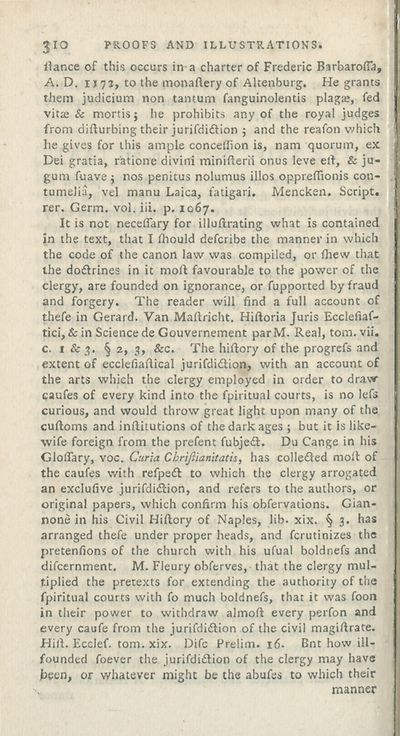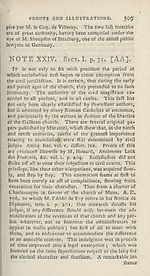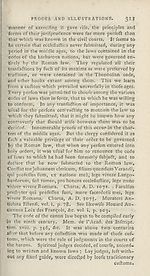Download files
Complete book:
Individual page:
Thumbnail gallery: Grid view | List view

JIO PROOFS AND ILLUSTRATIONS.
ilance of this occurs in a charter of Frederic Barbarofla,
A. D. 1171, to the monaftery of Altenburg. He grants
them judicium non tantum fanguinolentis plaga?, fed
vitae & mortis; he prohibits any of the royal judges
from difturbing their jurifdiftion ; and the reafon which
lie gives for this ample conceffion is, nam quorum, ex
Dei gratia, ratione divini miniflerii onus leve elf, & ju-
gum fuave ; nos penitus nolumus illos oppreffionis con-
tumelia, vel manu Laica, fatigari. Mencken. Script,
rer. Germ. vol. iii. p. 1067.
It is not neceflary for illulfrating what is contained
in the text, that I ihould defcribe the manner in which
the code of the canon law was compiled, or fhew that
the doflrines in it moll favourable to the power of the
clergy, are founded on ignorance, or fupported by fraud
and forgery. The reader will find a full account of
thefe in Gerard. Van Maftricht. Hifloria Juris Ecclefiaf-
tici, & in Science de Gouvernement parM. Real, tom. vii.
c. t & 3. § 2, 3, &c. The hiftory of the progrefs and
extent of ecclefiaflical jurifdidlion, with an account of
the arts which the clergy employed in order to draw
caufes of every kind into the fpiritual courts, is no lefs
curious, and would throw great light upon many of the
cuftoms and inlfitutions of the dark ages ; but it is like-
wife foreign from the prefent fubjeft. Du Cange in his
GlofTary, voc. Curia Cbrijlianitatis, has collefled moil of
the caufes with refpefl to which the clergy arrogated
an exclufive jurifdidtion, and refers to the authors, or
original papers, which confirm his obfervations. Gian-
none in his Civil Hiftory of Naples, lib. xix. § 3. has
arranged thefe under proper heads, and fcrutinizes the
pretenfions of the church with his ufual boldnefs and
difcernment. M. Fleury obferves, that the clergy mul¬
tiplied the pretexts for extending the authority of the
fpiritual courts with fo much boldnefs, that it was foon
in their power to withdraw almoft every perfon and
every caufe from the jurifdiilion of the civil magiftrate.
Hill. Ecclef. tom. xix. Difc Prelim. 16- Bnt how ill-
founded foever the jurifdidtion of the clergy may have
been, or whatever might be the abufes to which their
manner
ilance of this occurs in a charter of Frederic Barbarofla,
A. D. 1171, to the monaftery of Altenburg. He grants
them judicium non tantum fanguinolentis plaga?, fed
vitae & mortis; he prohibits any of the royal judges
from difturbing their jurifdiftion ; and the reafon which
lie gives for this ample conceffion is, nam quorum, ex
Dei gratia, ratione divini miniflerii onus leve elf, & ju-
gum fuave ; nos penitus nolumus illos oppreffionis con-
tumelia, vel manu Laica, fatigari. Mencken. Script,
rer. Germ. vol. iii. p. 1067.
It is not neceflary for illulfrating what is contained
in the text, that I ihould defcribe the manner in which
the code of the canon law was compiled, or fhew that
the doflrines in it moll favourable to the power of the
clergy, are founded on ignorance, or fupported by fraud
and forgery. The reader will find a full account of
thefe in Gerard. Van Maftricht. Hifloria Juris Ecclefiaf-
tici, & in Science de Gouvernement parM. Real, tom. vii.
c. t & 3. § 2, 3, &c. The hiftory of the progrefs and
extent of ecclefiaflical jurifdidlion, with an account of
the arts which the clergy employed in order to draw
caufes of every kind into the fpiritual courts, is no lefs
curious, and would throw great light upon many of the
cuftoms and inlfitutions of the dark ages ; but it is like-
wife foreign from the prefent fubjeft. Du Cange in his
GlofTary, voc. Curia Cbrijlianitatis, has collefled moil of
the caufes with refpefl to which the clergy arrogated
an exclufive jurifdidtion, and refers to the authors, or
original papers, which confirm his obfervations. Gian-
none in his Civil Hiftory of Naples, lib. xix. § 3. has
arranged thefe under proper heads, and fcrutinizes the
pretenfions of the church with his ufual boldnefs and
difcernment. M. Fleury obferves, that the clergy mul¬
tiplied the pretexts for extending the authority of the
fpiritual courts with fo much boldnefs, that it was foon
in their power to withdraw almoft every perfon and
every caufe from the jurifdiilion of the civil magiftrate.
Hill. Ecclef. tom. xix. Difc Prelim. 16- Bnt how ill-
founded foever the jurifdidtion of the clergy may have
been, or whatever might be the abufes to which their
manner
Set display mode to:
![]() Universal Viewer |
Universal Viewer | ![]() Mirador |
Large image | Transcription
Mirador |
Large image | Transcription
| Antiquarian books of Scotland > Kings & rulers > History of the reign of the Emperor Charles V. > Volume 1 > (328) |
|---|
| Permanent URL | https://digital.nls.uk/109186267 |
|---|
| Description | By William Robertson. London : Cadell and Davies, 1798. |
|---|---|
| Shelfmark | ABS.1.76.13 |
| Additional NLS resources: | |
| Description | Thousands of printed books from the Antiquarian Books of Scotland collection which dates from 1641 to the 1980s. The collection consists of 14,800 books which were published in Scotland or have a Scottish connection, e.g. through the author, printer or owner. Subjects covered include sport, education, diseases, adventure, occupations, Jacobites, politics and religion. Among the 29 languages represented are English, Gaelic, Italian, French, Russian and Swedish. |
|---|

